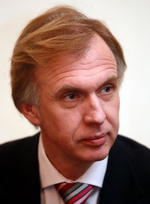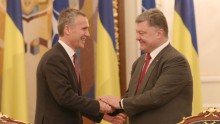It seems that the NATO-Ukraine relations have finally got a new impetus. Such a conclusion can be drawn from the results of Jens Stoltenberg’s first mission to our country as the NATO Secretary General. One particular thing that makes this two-day visit stand out is that after opening the training games in Yavoriv on Monday, Stoltenberg participated in the meeting of Ukrainian National Security and Defense Council, and it was the first time in the history of relations between the Alliance and Kyiv that the Secretary General would do this. “Today’s meeting is a historical one. For the first time it involves a great friend of Ukraine – the Secretary General of the North Atlantic Treaty,” said President Poroshenko while opening the session.
Another milestone of the visit was the signing of three documents: the Roadmap of Partnership Program on Strategic Communications, the joint declaration on strengthening the cooperation in the areas of defense and technology between Ukraine and NATO, and the agreement on the status of NATO representation in Ukraine.
Confirming the progress in our mutual relations, Ukrainian president stated that just 18 months ago NATO experts could not enter the Defense Ministry, the General Staff, or the Security Service. Since that time, the NATO-Ukraine partnership has went a huge distance ahead, as he wrote on Twitter.
But it should be recalled that Ukraine’s desire for NATO accession was laid out on May 23, 2003 in the National Security and Defense Council decision “On Ukraine’s NATO strategy” during the term of Yevhen Marchuk’s presidency in the NSDC. A year later, the basic principles and provisions of the National Security had been prescribed in the Law of Ukraine “On National Security.” Interestingly, the law had been as well voted for by the Party of Regions, Viktor Yanukovych being the head of it at the time.
Since its inception, Den newspaper has been a consistent supporter and promoter of our country’s Euro-Atlantic course. The oligarchs, who own the popular TV-channels, had no interest whatsoever in this topic. Quite the opposite, they were inviting notorious politicians such as Kolesnichenko to their television talk-shows, discrediting the very idea of Ukraine’s integration into NATO.
On the one hand, the responsibility for the failure of the Atlantic course should be borne both by the oligarchs and by Medvedchuk, who was leading the pro-Putin politics in Ukraine. On the other hand, we must remember the story of the Bucharest summit in 2008, when German Chancellor Angela Merkel and the then president of France Nicolas Sarkozy had blocked Ukraine and Georgia’s Membership Action plans. As a result, in August of the same year, Russia invaded Georgia and illegally occupied 20 percent of its territory. And the last year, apparently realizing that NATO would not respond, as it was the case with Georgia, Moscow illegally annexed Crimea and now maintains its aggression in eastern Ukraine.
In his speech at the NSDC meeting, Poroshenko has defined the country’s neutral status policy, proclaimed by the previous government, as “a crime against the national interests of Ukraine.” It is indeed so, but he also asserted that Ukraine was not ready for membership yet and that a referendum on NATO membership for Ukraine would be held after he would have reformed the country – how do these words correspond with the best interest of Ukraine?
It should also be recalled that in 2008 Kyiv had been refused the MAP precisely because of the lack of political will on behalf of the Ukrainian leadership in adhering to the course of Euro-Atlantic integration, and because of the low public support for NATO membership. Thus the president’s logic of postponing the referendum seems strange, as now he can take advantage of today’s high public support for NATO membership and establish it as the popular will.
 The Day has asked Volodymyr OHRYZKO, former Foreign Minister of Ukraine, to comment on the NATO Secretary General’s visit to Ukraine.
The Day has asked Volodymyr OHRYZKO, former Foreign Minister of Ukraine, to comment on the NATO Secretary General’s visit to Ukraine.
“This visit is extremely important for both sides: Ukraine and NATO. First of all, this is the first visit of the NATO Secretary General after Ukraine has finally changed its foreign policy vector, abandoning the completely inadequate doctrine of non-alignment and once again formulating in official documents its desire to be a NATO member, albeit not very clearly.
“Therefore, it demonstrates a revival of our relationship, which is important. Moreover, this revival comes against the backdrop of the Russian aggression, which urged NATO members and the Alliance as a whole to rethink its policy towards Russia very seriously. Perhaps, there are already no responsible politicians in any NATO country, which would put into question the fact that Russia becomes a global threat, one they must seek some answers to.
“In this regard, Ukraine’s role can be crucial. For us it also provides the opportunity to rethink our future in NATO. I am somewhat disappointed with the emphasis of some speeches related to this visit. I think we should not speak about our unpreparedness to join NATO at the moment; we should speak about our intention and desire to pass through this way as quickly as we can. And in this context we should talk about the tools we and NATO could utilize in order to adhere to this course effectively and without problems.
“Actually, the latter is the goal of a newly-established NGO, called the ‘Movement for Ukraine in NATO.’ I am honored to be among the founders of this organization, headed by the first president of Ukraine Leonid Kravchuk; its leadership includes prominent politicians, such as Yevhen Marchuk among others, former MPs, ministers, diplomats, political scientists, social activists. This is what we need today – namely, to communicate the truth about NATO to society and explain why the direct participation in NATO is beneficial for both parties. In this regard, one of our intentions is to hold a national referendum on that matter, without postponing it for the long term.
“Therefore, it can be said that the two sides have shown their interest; the important political signal has been communicated between us and NATO. And from a practical standpoint, the documents signed are also very important – in particular, in the context of countermeasures to Russian propaganda war. The idea of a roadmap regarding strategic communications is far-reaching, as it will be an essential element in countering the Russian aggression in the field of information.
“In general, I believe that this is a positive result that gives us now a chance not only to think about our prospects, but also to take a positive decision on restoring the Ukrainian Embassy to NATO, which would be headed by its own ambassador, not coming as an extra duty to the already incumbent ones. The increased status of NATO representation in Ukraine is also a very positive development. Therefore, I think it would be a good opportunity we should make use of quickly to pull Ukraine closer to NATO.”
Did you notice the alarming details in the president’s speeches, in particular about the referendum? Why do you think our politicians fail to mention the example of Turkey and Greece entry to NATO in 1952, and did not emphasize the need for the soonest possible accession of Ukraine?
“I think for some obscure reason our leaders do not want to engage in the practical preparation for the accession. Perhaps this is the old syndrome of ‘What will Mrs. Grundy say?’ but we must give it up already. There are many examples of countries that had problems with the preparation to the accession and the accession itself, and even of those that had problems after the accession.”
“Thus I would not have sought an explanation on why we couldn’t do it; I would be looking for arguments why we should. And having found them, we would have communicated with the public in an entirely different way – and not only with the Ukrainian public, but also with our partners abroad. For if we clearly formulate our purpose, clearly state our desire, and clearly confirm it through the will of the people – then, certainly, in the West and everywhere else there will hardly be many of those who would oppose the decision of the majority of the Ukrainian nation.”
During his visit to Ukraine, Stoltenberg has repeatedly called on Russia to withdraw troops from the eastern Ukraine and start implementing the Minsk agreement. What does NATO really need to do in order to make Russians hear them, and most importantly fulfill the conditions stipulated by the abovementioned agreement?
“It is completely futile to influence Russia with exhortations; the Russians do not hear appeals and reject them. What they accept is the facts. Thus NATO must present them with the facts: above all, by strengthening its presence on their east side, increasing the combat capability of NATO member countries – and, as well, by providing practical military assistance to Ukraine. Powerful and efficient Ukrainian army would be an extremely important incentive for Putin to begin his gradual retreat. These would be the facts that could help Ukraine defend itself, and also help NATO show itself as a powerful player that is capable of creating events, not only responding to events created by the Russian Federation.”








